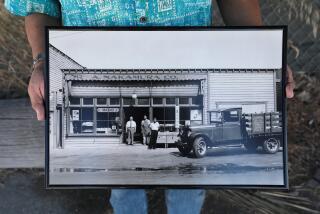Today’s Sensibilities Don’t Apply to Voices From the Past
- Share via
Often, memorials are created not only to preserve the past but also to help shape the future. On Nov. 9, the American people will dedicate a new memorial in Washington, one that honors Japanese American patriotism in World War II despite the internment of more than 120,000 Japanese Americans for no reason other than their ancestry.
The dedication of the National Japanese American Memorial is the final step in a journey that began 12 years ago when the House passed a law extending a formal apology to Japanese Americans for the internment and provided a $20,000 redress payment to each detainee.
Sadly, the celebration of the memorial has been overshadowed by a controversy that threatens to divide the Japanese American community. A quote by Mike Masaoka, who was national secretary for the Japanese American Citizens League during the war, has come under attack by those who feel it does not reflect the sentiments of the full community.
Memorializing painful reminders of our past invariably engenders strong emotions in people. We run the risk all too often, as in this case, of applying today’s sensibilities, standards and even motivations to people who lived in a much different era.
Masaoka was 25 years old when he penned the words that would embroil the memorial in such controversy today. He wrote: “I am proud that I am an American citizen of Japanese ancestry, for my very background makes me appreciate more fully the wonderful advantages of this nation. I believe in her institutions, ideals and traditions; I glory in her heritage; I boast of her history; I trust in her future.”
Masaoka’s sincerity as a patriot is not in question, nor is his importance to the development of the memorial. He was a veteran of the 442nd Regimental Combat Team, the troop of 3,000 Japanese Americans who volunteered service during World War II and was recognized as the most decorated in World War II. Masaoka led the drive for a memorial to the more than 800 Japanese American servicemen who gave their lives.
The objection to his quote seems to stem from the belief that, as the unofficial spokesperson for the Japanese American community during the internment, he colluded with federal authorities and facilitated the internments rather than opposing them.
It is ironic today, with labels like “Generation X” and the stereotypes that accompany them, that people should expect a 25-year-old in the crisis of war to stand in opposition to the U.S. government, the FBI and the U.S. military.
When Executive Order 9066 was delivered by President Roosevelt to detain all Japanese Americans on the West Coast, Col. Karl R. Bendetsen of the U.S. Army was prepared to follow those orders within 24 hours. In Seattle, Mayor Earl Milikin had mounted officers prepared to march Japanese Americans over the mountains to eastern Washington. Wyoming Gov. Nels Smith declared: “If you bring Japanese into my state, I promise they will be hanging from every tree.”
In 1942, Masaoka was called before a House committee investigating the evacuation. He testified that if “evacuation is primarily a measure whose surface urgency cloaks the desires of political or other pressure groups who want us to leave merely from motives of self-interest, we feel that we have every right to protest and to demand equitable judgment on our merits as American citizens.” Shortly after, when Terminal Island in Southern California was evacuated on two day’s notice, Masaoka was told: “This is a military necessity. Any resistance will be interpreted as acts of disloyalty and will be met with appropriate action.”
Years later, after having fought for and won citizenship for the first time for Japanese immigrants, and after having fought for recognition for those who served, Masaoka recalled: “We struggled for our rights at a time before demonstrations and sit-ins and loud protests in front of news cameras had become acceptable. We sought redress by direct appeal to Congress and state legislatures and courts. In short, we made the democratic system work.”
Masaoka passed away in 1991. The memorial does not seek to rewrite history. It seeks to shed a light on history and the lessons of war so that we may learn from the past and write our collective future in a way that ensures that these deeds will not befall other Americans ever again. Mike Masaoka played a significant role in that history, and his deeds should be remembered and honored.
More to Read
Sign up for Essential California
The most important California stories and recommendations in your inbox every morning.
You may occasionally receive promotional content from the Los Angeles Times.










